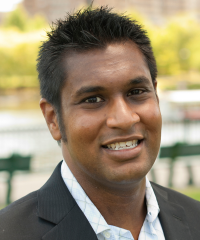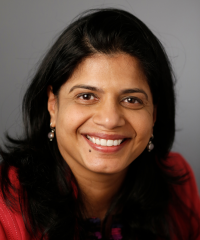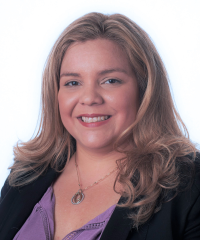ADRD 2024 has passed
Wednesday, April 24, 9:30 a.m.–4 p.m.
In person at the Discovery Building and via Live Stream
The annual Alzheimer's Disease & Related Dementias Research Day is hosted by the Wisconsin Alzheimer’s Disease Research Center (ADRC). It is designed to encourage collaboration and promote scientific thought among faculty, students and researchers from a wide range of disciplines across the UW–Madison campus.
Read a recap of the 2024 event on our website.
Watch recordings of the featured and lightning presentations below or on our YouTube page.
Agenda
Presentations will be in the H.F. DeLuca Forum
The Poster Session will be in the Open Court
9:30-10 a.m. — Registration/poster preview
10 a.m. — Welcome and opening remarks
10:20 a.m. — Featured speaker: Kris Saha, PhD, associate professor of biomedical engineering, University of Wisconsin–Madison — "CRISPR Cell and Gene Therapy for Neurological Diseases and Aging”
- Learn more about Kris Saha, PhD
- Image

Krishanu “Kris” Saha (he/him) is an associate professor of biomedical engineering, and medical history and bioethics at the University of Wisconsin–Madison. He is the McPherson Eye Research Institute’s Retina Research Foundation Kathryn and Latimer Murfee Chair. His lab is a member of the Wisconsin Institute for Discovery (WID), Stem Cell and Regenerative Medicine Center, Robert F. Holtz Center on Science and Technology Studies, and Forward Bio Institute. Before he arrived in Madison, Dr. Saha studied chemical engineering and biotechnology at Cornell University, the University of Cambridge and the University of California, Berkeley. In 2007 he became a Society in Science: Branco-Weiss fellow in the laboratory of Professor Rudolf Jaenisch at the Whitehead Institute for Biomedical Research at MIT and in the Science and Technology Studies program at Harvard University with Professor Sheila Jasanoff in Cambridge, Massachusetts. At UW–Madison, major thrusts of his lab involve gene editing and cell engineering of human cells found in the retina, central nervous system, liver and blood. He has published more than 90 scientific manuscripts, filed several patents and received awards that include the National Science Foundation CAREER Award, Biomedical Engineering Society’s Rising Star Award and Gund Harrington Scholar Award. He is the leader of the gene therapy biomanufacturing impact area of the Grainger Institute for Engineering, co-director of the Global Observatory on Genome Editing, and a member of the National Academies’ Forum on Regenerative Medicine, the National Science Foundation’s Center for Cell Manufacturing Technologies (CMaT) and the National Institutes for Health’s Somatic Cell Genome Editing (SCGE) Consortium.
Dr. Saha's talk, "CRISPR Cell and Gene Therapy for Neurological Diseases and Aging," will happen at 10:20 a.m. on April 24.
10:50 a.m. — Lightning Presenters Group 1
- Lightning Presenters Group 1
- Lauren W. Yowelunh McLester-Davis, PhD, Gleason Laboratory, "Biological age predicts cognitive performance for underrepresented middle-aged and older participants from the University of Wisconsin Alzheimer's Disease Cohorts"
- Haylee Hamilton, BS, Pehar Lab, Department of Medicine, Geriatrics, "Regulation of astrocyte-mediated neuroinflammation by FABP7 in aging and Alzheimer’s disease"
- Andy Madrid, PhD, Alisch Lab, Department of Neurosurgery, "Whole genome methylation sequencing in blood identifies extensive differential DNA methylation in mild cognitive impairment (MCI)"
- Julia Illiano, BS, Harris Lab, Department of Biomolecular Chemistry, "Sleeve gastrectomy improves cognition and frailty in AD prone mice"
- Rachael Wilson, PhD, Johnson Lab, Wisconsin ADRC and Wisconsin Registry for Alzheimer's Prevention (WRAP), "Longitudinal Plasma pTau217 Measurements in Preclinical Alzheimer's Disease
11:10 a.m. — Poster Session Group 1
Noon — Lunch
12:30 p.m. — Lightning Presenters Group 2
- Lightning Presenters Group 2
- Aaliyah Mushtaque, undergraduate student, Bendlin Lab, "Gut Microbiota Composition Differentially Abundant in Amyloid-Positive and Amyloid-Negative Individuals May be Associated with Cognitive Function"
- Andrew McVea, MS, Brad Christian Lab, Department of Medical Physics, "Longitudinal beta-amyloid measured with [C-11]PiB accumulates at an accelerated rate in Down syndrome compared to neurotypical populations"
- Ramiro Reyes, PhD, Johnson Lab, Wisconsin Registry for Alzheimer's Prevention (WRAP), "Effect of Refrigeration on Alzheimer's Disease Biomarker Measurements in Plasma"
- Rachel C. Otte, BS, MPH, Center for Health Disparities Research, "Public data tracing: A novel method for retrospectively collecting occupational data for brain bank research donors"
- Natascha Merten, PhD, MS, Merten Lab, "Sensory and Motor Functions Improve Long-Term Predictions of Cognitive Decline and Neurodegeneration"
1 p.m. — Poster Session Group 2
2 p.m. — Featured speaker: Rema Raman, PhD, professor of neurology of the Keck School of Medicine at the University of Southern California — "Accelerating the Impact of Next Generation AD/ADRD Clinical Trials through Inclusion and Workforce Development"
- Learn more about Rema Raman, PhD
- Image

Rema Raman is a professor of neurology at the University of Southern California (USC) and the director of the Biostatistics Section and the Recruitment & Retention Section at USC’s Alzheimer’s Therapeutic Research Institute. She also serves as the co-lead of the Biostatistics Unit, the Recruitment, Engagement and Retention Unit and the Inclusion, Diversity and Education in AD Clinical Trials (IDEA-CT) Unit for the National Institute of Health funded Alzheimer Clinical Trials Consortium. Dr. Raman has extensive experience as a biostatistician and clinical trialist, providing leadership and support to the design, coordination, conduct and analyses of clinical trials in Alzheimer’s disease, acute stroke, post-traumatic stress disorder and traumatic brain injury. Her research interests are in efficient clinical trial design and analysis, centralized statistical monitoring and data visualization, recruitment and retention science and missing and longitudinal data analysis topics. Dr. Raman is committed to the effective teaching of biostatistics and clinical trial methodology and is the co-director of the National Institute on Aging and Alzheimer’s Association-funded Institute of Methods and Protocols for Advancement of Clinical Trials in ADRD (IMPACT-AD).
Dr. Raman's talk, "Accelerating the Impact of Next Generation AD/ADRD Clinical Trials through Inclusion and Workforce Development," will happen at 2:00 p.m. on April 24.
2:35 p.m. — Featured speaker: Maria Mora Pinzon, MD, MS, FACPM, assistant professor, Division of Geriatrics and Gerontology — "What Latinos Think About ADRD - A Population Survey and Implications for Research"
- Learn more about Maria Mora Pinzon, MD, MS, FACPM
- Image

Dr. Mora Pinzon is a physician-scientist, board certified in preventive medicine and public health. She graduated from the Universidad Central de Venezuela, Escuela Jose Maria Vargas in Caracas Venezuela, and completed her preventive medicine residency at the University of Wisconsin–Madison. She is currently an assistant professor on the tenure track at the University of Wisconsin–Madison, Department of Medicine, Division of Geriatrics and Gerontology. Her work seeks to improve healthcare access for patients living with dementias and their caregivers, particularly among Latino populations. Among her awards, she was selected as 2018 Young Physician of the Year by the National Hispanic Medical Association and 2020 William Kane Rising Star Award from the American College of Preventive Medicine. Dr. Mora Pinzon is a REC scholar with the Wisconsin Alzheimer’s Disease Research Center, and received a K99/R00 from the National Institute of Aging to fund her project “Improving Access to Alzheimer’s Disease and Related Dementia’s Care Services for Latinx Individuals at Community Health Clinics".
Dr. Mora Pinzon's talk, "What Latinos Think about ADRD—A Population Survey and Implications for Research," will be at 2:35 p.m. on April 24.
3 p.m. — Awards celebration/networking social
4 p.m. — Closing/appreciations




